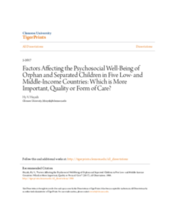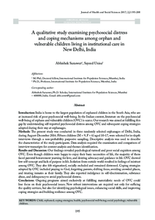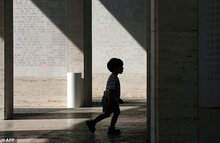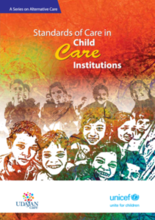childrens_living_arrangement
children_living_without_bio
Displaying 301 - 310 of 427
This study explored the extent to which components of quality of care predicted psychosocial well-being of orphaned and separated children (OSC), as well as the extent to which these components of quality of care and demographic factors moderated the associations between care settings and psychosocial well-being of orphaned and separated children (OSC).
This news article describes the plight of India's missing children, focusing on efforts to end child trafficking in the country.
This report presents the findings from a study that aimed to explore the application in practice of the ‘necessity principle’ from the Guidelines on Alternative Care for Children (UN, 2009) by using three quantitative and three qualitative indicators that provide information about whether children and families have received support to the fullest extent possible before a child ends up outside of parental care arrangements in formal or informal care, or living alone.
Under new project DCPU aims to place 100 children into foster care.
Article from IndiaToday reports West Bengal plans to determine the number of street children living within the state.
This study investigated the psychosocial distress and coping mechanisms of institutionalized children living in New Delhi, India.
The aim of this study is to assess the nutritional and cognitive status in institutionalized orphans which might help to formulate effective interventions for improving the nutritional status of vulnerable children in future.
Voice of Asia reports that Indian police arrested heads of an adoption centre said to have trafficked at least 17 children to couples in foreign countries.
Elevate Children Funders Group (ECFG) recommends philanthropists avoid donating to orphanages and instead invest in programs that help to build stronger families.
This booklet on standards of care in child care institutions is part of a Series on Alternative Care covering the latest legal and policy framework on Alternative Care in India, which has been presented in an easy-to-understand style so that they can be used as an effective reference material by all the stakeholders.





